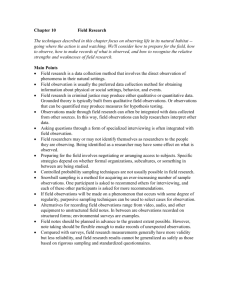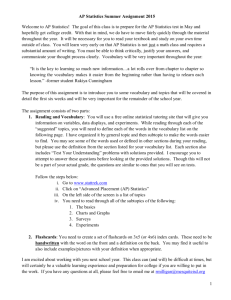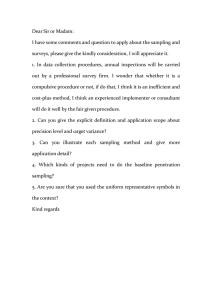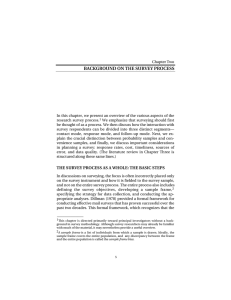College of Public Health and Health Professions Chris McCarty (352) 392-2908 x101
advertisement
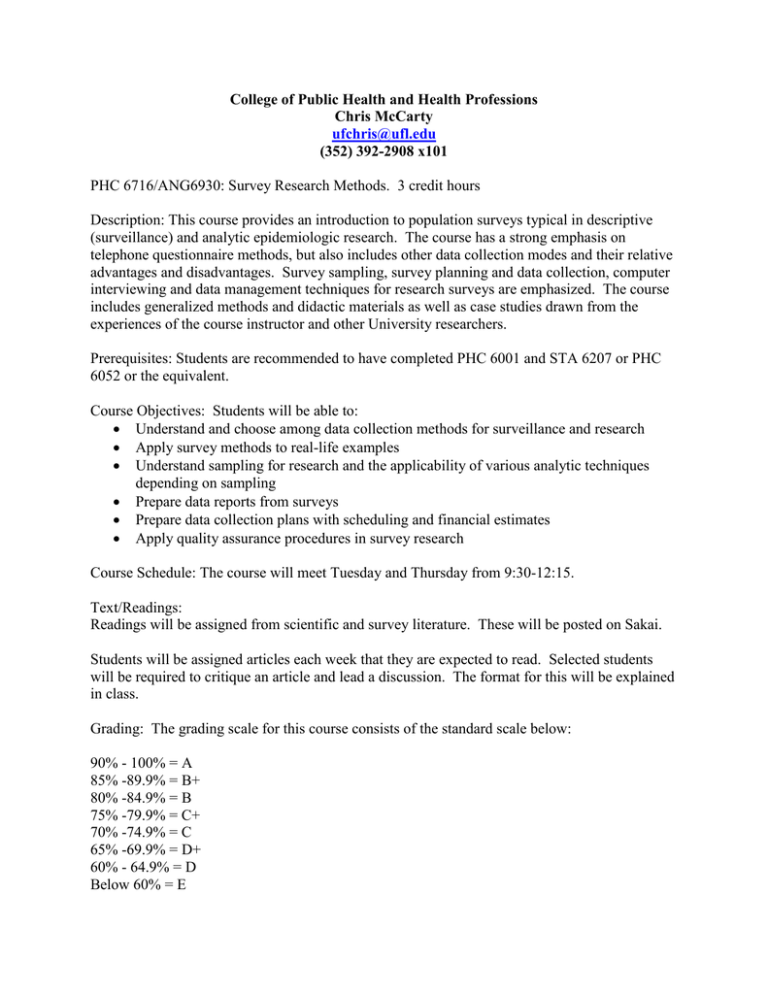
College of Public Health and Health Professions Chris McCarty ufchris@ufl.edu (352) 392-2908 x101 PHC 6716/ANG6930: Survey Research Methods. 3 credit hours Description: This course provides an introduction to population surveys typical in descriptive (surveillance) and analytic epidemiologic research. The course has a strong emphasis on telephone questionnaire methods, but also includes other data collection modes and their relative advantages and disadvantages. Survey sampling, survey planning and data collection, computer interviewing and data management techniques for research surveys are emphasized. The course includes generalized methods and didactic materials as well as case studies drawn from the experiences of the course instructor and other University researchers. Prerequisites: Students are recommended to have completed PHC 6001 and STA 6207 or PHC 6052 or the equivalent. Course Objectives: Students will be able to: Understand and choose among data collection methods for surveillance and research Apply survey methods to real-life examples Understand sampling for research and the applicability of various analytic techniques depending on sampling Prepare data reports from surveys Prepare data collection plans with scheduling and financial estimates Apply quality assurance procedures in survey research Course Schedule: The course will meet Tuesday and Thursday from 9:30-12:15. Text/Readings: Readings will be assigned from scientific and survey literature. These will be posted on Sakai. Students will be assigned articles each week that they are expected to read. Selected students will be required to critique an article and lead a discussion. The format for this will be explained in class. Grading: The grading scale for this course consists of the standard scale below: 90% - 100% = A 85% -89.9% = B+ 80% -84.9% = B 75% -79.9% = C+ 70% -74.9% = C 65% -69.9% = D+ 60% - 64.9% = D Below 60% = E Grading Methods: The assessment will include homework assignments, quizzes, an individual course paper and associated class presentation, and class participation. Homework assignments = 10% Individual project = 20% (Based on oral presentation) Quizzes = 30% (Three quizzes at 10% each) Class Project = 20% Class participation = 20% (Based on in class dialogue and summaries of articles) Class Attendance: Class attendance is mandatory for students. Excused absences follow the criteria of the UFL Graduate Catalogue (e.g., illness, serious family emergency, military obligations, religious holidays), and should be communicated to the instructor prior to the missed class day when possible. UFL rules require attendance during the first two course sessions, and students also must attend the final two course sessions of student presentations for this class. Missing three scheduled sessions will result in a failure. Regardless of attendance, students are responsible for all material presented in class and meeting scheduled due dates for class assignments. Finally, students should read the assigned readings prior to the class meetings, and be prepared to discuss the material except for the first class session. Homework: Students will be assigned a homework project at the end of selected classes that will be due at the beginning of the next class. Individual Projects: The survey research industry faces methodological challenges given technological innovation and news modes of communication. Students will work in teams with the instructor on a publishable research project from a list that will be provided at the end of the first class. Teams will present their findings on the last day of class. Survey Project: Students will be trained to conduct telephone survey research per the protocols of the UF Survey Research Center. A topic for the survey will be discussed in class. Policy on Make-Up Work: Students are allowed to make up work as the result of illness or other unanticipated circumstances warranting a medical excuse and resulting in the student missing a homework or project deadline, consistent with College policy. Documentation from a health care provider is required. Work missed for any other reason will receive a grade of zero. Accommodations for Students with Disabilities: Students requiring accommodations must first register with the Dean of Students' Office. The Dean of Students' Office will provide documentation to the student who must then provide this documentation to the faculty member when requesting accommodation. The College is committed to providing reasonable accommodations to assist students in their coursework. Structure of Class: Each class will consist of two parts. The first will be a presentation on a fundamental aspect of the survey research process. I will present a PowerPoint on the topic for about an hour. This will be followed by student-led discussion of the assigned articles for about an hour. We will devote time for discussion of your particular research needs and experiences with the survey project. Course Outline: May 13: Course Introduction Overview of Course and syllabus Overview of UF Survey Research Center Discussion of survey project May 20: Survey Modes – Telephone, Mail, Web, Face-to-Face Defining the population Units of analysis Survey Modes (Telephone, Mail, Web, Face-to-face) Random Digit versus Listed Samples for telephone surveys Options from Sample Vendors (GENESYS and Survey Sampling) Case Study – Medicaid Reform and Web of Knowledge May 27: Survey Modes – New Challenges Cell phone problem Mixed modes Address based sampling Internet Panels Mobile Phone Survey Designs Case Study – Child Trust June 3: Margin of Error, Sample Size and Sample Design Calculation of margin of error Power analyses for determining sample size Predicting and planning for attrition from sampling frames, fixed lists Respondent selection Case Study – FHIS and Tallahassee Project Homework – Calculate margins of error June 10: Response rates, Disposition Coding What is a response rate and what should it be used for? Overview of AAPOR and CASRO disposition coding Review of different ways to calculate response rates Issues in improving response and quality assurance Case study – BRFSS Cell and CCI Homework 4 – Calculate response rates June 17: Questionnaire Design, Question Wording and Incentives Quiz 1 – Margin of error Categorical (nominal) questions Ordinal questions Interval questions Open-ended questions Order Effects Case study – Web of Knowledge versus Elder Affairs Survey July 1: Survey Shift July 8: Existing health survey data sets and Incentives Quiz 2 – Response rates Widely used Epidemiology modules (e.g. CAHPS) BRFSS, NHIS, NIS, ADD HEALTH Estimating Cost Things to include in a Contract Incentives July 15: Analyzing Survey Data Quiz 3 – Reading crosstabs Analyzing Data What is Weighting and How to Do It Stratified and quota samples Imputation for Missing Values Case Study -- Hurricane July 22: Doing Surveys Internationally, hard-to-count populations International surveys (DHS), Surveys in developing countries Capture-Recapture Multiplier Method Respondent Driven Sampling Network Scale-up July 29: Social Network Analysis and the IRB IRB Introduction to social networks Whole networks versus personal networks One-mode versus two-mode August 5: Student Presentations

